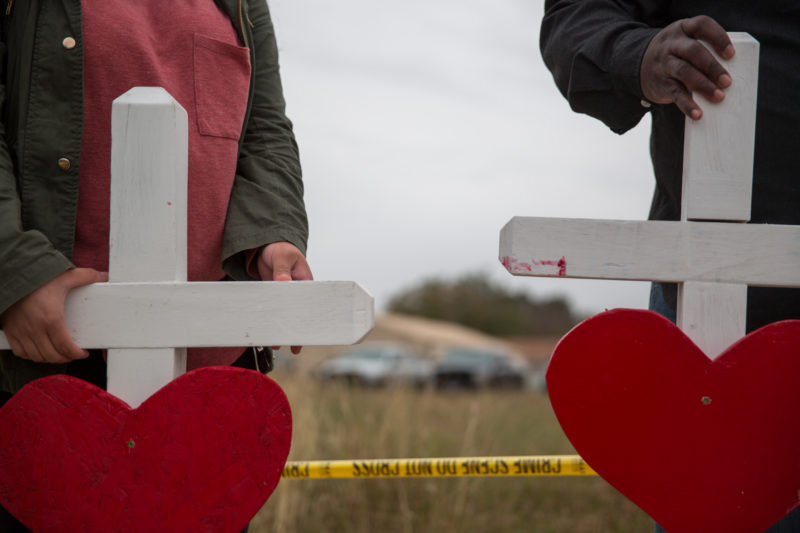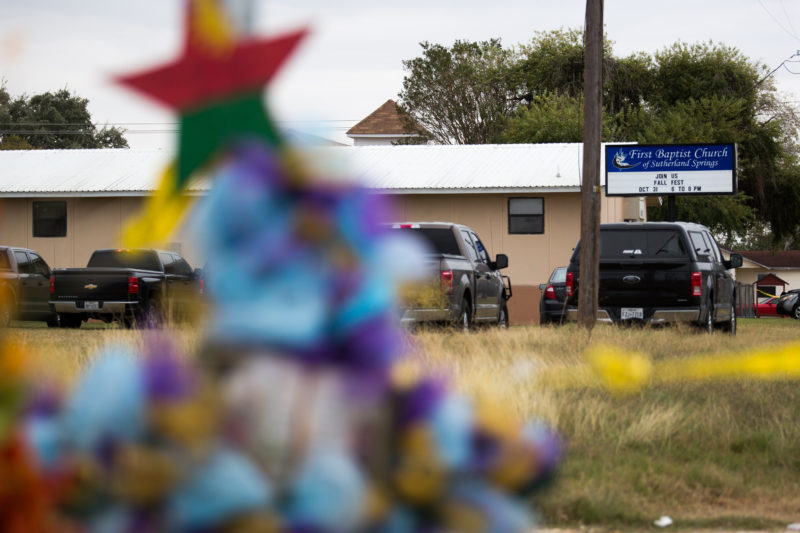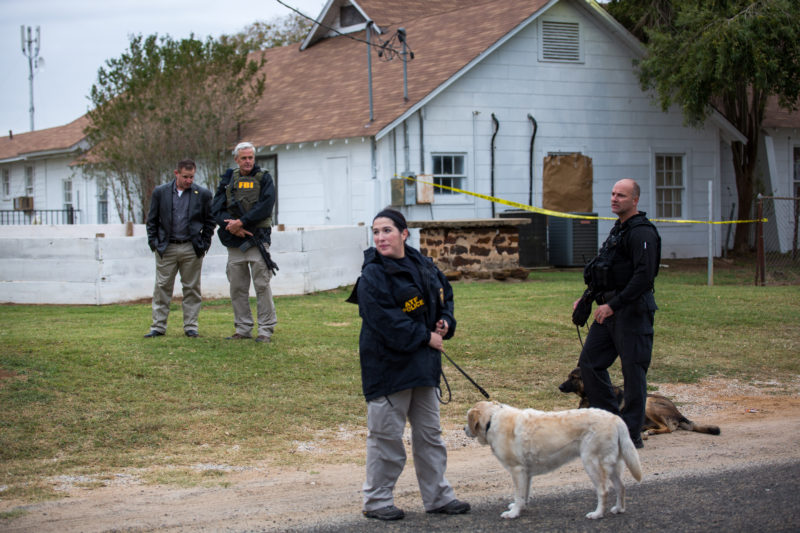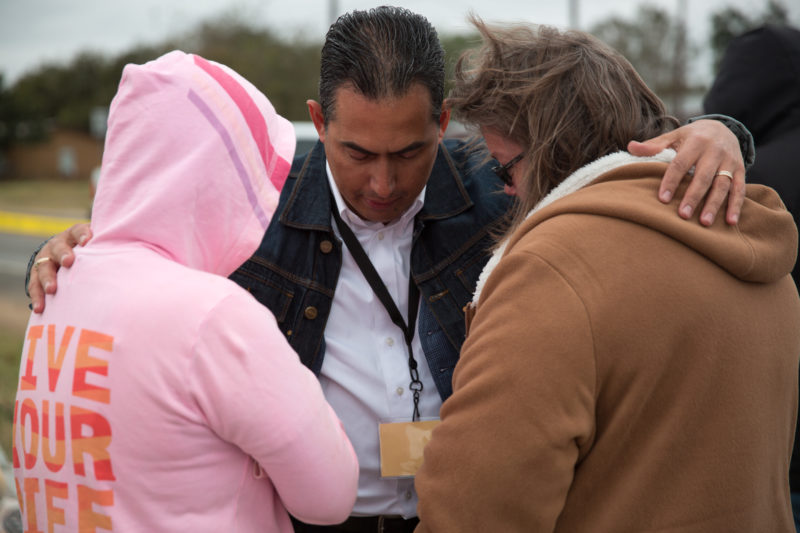Baptist Conventions Address Safety After Sutherland Springs Shooting
By Taylor Jackson Buchanan
Photography By Shelby Knowles
Reporting Texas

Mourners place crosses in front of the First Baptist Church in Sutherland Springs to represent each person who died during the shooting.
Baptist leaders are using upcoming statewide annual gatherings to offer security training to some members following the recent shooting at First Baptist Church of Sutherland Springs.
From Nov. 12 to 14, some 8,000 churches and their three million members will send representatives to two of the largest annual church conventions in the country, the Baptist General Convention of Texas to be held in Waco and the Southern Baptists of Texas Convention hosted in Dallas. Perennial issues like vacation Bible school and deacon training will likely pale in light of heightened concerns about church security, officials from both conventions said.
“Security has been something our churches have sort of been interested in for some time now,” said Gary Ledbetter, director of communications for the SBTC. “They’re very interested in it right now.”
As news broke Nov. 5 that gunman Devin Kelley had killed 26 people and wounded 20 more, Baptist leaders made quick decisions to equip their member churches – small and large, urban and rural – with information about essential safety features and protocols to make places of worship less vulnerable targets.

The First Baptist Church in Sutherland Springs, Texas, where a gunman shot and killed dozens of people attending church services on Nov. 5, 2017.
First Baptist Church of Sutherland Springs is a member of the Southern Baptists of Texas Convention, which represents about a million parishioners statewide. On Nov. 13, in conjunction with Prestonwood Baptist Church, the SBTC is hosting a two-hour church security seminar that will include information on site safety, responding to emergencies and training volunteers to be aware of suspicious behaviors. This seminar was added to the agenda in response to the events in Sutherland Springs.
Second Baptist Church Houston and Prestonwood, north of Dallas, are among the largest and fastest-growing churches in the nation, with multiple campuses and 65,000 and 42,000 members respectively. Megachurches such as these are considered frontrunners in church security, Ledbetter said. They direct significant resources toward elite building security, training health and safety teams and, in some cases, hiring state-certified security forces. Large churches typically have a special emphasis on children’s safety as well, including detailed check-in and pick-up procedures.
Pastors of small, rural congregations, on the other hand, say they have vastly different needs. First Baptist in Sutherland Springs, for instance, had about 100 members before the shooting.
Dick Sisk, a 69-year-old pastor from a one-stoplight town outside of San Antonio, says his 80-person church is similar to First Baptist of Sutherland Springs. Although he cited no specific threat, he asked that the location of his church be withheld for safety reasons.
“Of course, we’re different than a metro church or a larger church,” Sisk said. “There’s about a 15-minute 911 response time where we are. We’ve got to pretty well take care of ourselves out here.”
Sisk thought about attending the SBCT seminar on security. But he decided that rather than spend time and money to travel to Dallas, he would rely on expertise from his congregants with police training. Besides, by the time Sisk heard about the seminar, he already had a safety plan in motion.
As news broke of the shooting in neighboring Sutherland Springs, Sisk called two congregants who work in law enforcement. The next morning, they met, prayed for wisdom and got to work developing a three-phase plan with proactive and reactive elements should an emergency unfold in their community.

The FBI secures the perimeter around the church in Sutherland Springs. Churches across the state are reevaluating security protocols in the wake of the shooting.
The plan includes strategically placing the two law enforcement officers – one a top marksman at the state level and the other a former wrestler Sisk described as “300 pounds of pure muscle” – in the sanctuary and training congregants how to respond to different scenarios. The training will start soon. The Nov. 12 sermon has been revamped as a training tool to introduce the protocols.
“It’s a typical rural, redneck, Hill Country church,” Sisk said, laughing. “On any given Sunday, eight to 10 people will be carrying – and that’s just the women. But the thing about it is you don’t want everybody to jump up on top of the pews and start shooting each other. It’s got to be controlled.”
The church is doing other things as well – installing new locks on the doors and selecting people to communicate with emergency responders.
“We’re just like everybody else,” Sisk said. “We thought it would never happen in our little community. It’s sad to think about having to do this in America.”
The Southern Baptist Convention of Texas split from the Baptist General Convention of Texas in 1998 over differences between conservatives and moderates, Biblical interpretations and varying stances on social issues.
“We used to be one convention, now we’re two,” said Steve Vernon, associate executive director of BGCT. “But with this kind of tragedy, there’s no place to draw lines.”
In addition to the church security seminar next week, the SBTC is planning regional security conferences in Plano, Houston, Lubbock, El Paso and a city in East Texas that hasn’t been chosen. These will happen monthly from December to April.
Member churches can request that the SBTC cover the cost for a security specialist to evaluate the safety of a church building, according to information posted on the group’s website. This includes a review of access points and an evaluation of current safety measures.
The Baptist General Convention of Texas also added a workshop on church safety after Sutherland Springs.
“We want to help our churches know where the resources are that they will need to remain safe in the kind of world we live in,” said Steve Vernon, associate executive director of BGCT. “Having been a pastor for 32 years, and knowing what [Sutherland Springs] Pastor Pomeroy is dealing with, it’s just heartrending, and we grieve with them.”
Vernon has pastored in small, community churches.
“Typically, you think, ‘Yeah, we’re a soft target, but we all know each other and that kind of thing doesn’t happen here.’ But it does. And you can’t 100 percent guarantee everybody it’ll never happen again. There are bad people out there.”

Mourners pray together at a memorial near the First Baptist Church in Sutherland Springs, November 8, 2017.
Leaders of both Baptist organizations say they are trying to help their churches know where to find the resources they need to feel safe.
“But when you’re an organization that reaches out to help hurting people, it’s hard to defend yourself, too,” Vernon said.
Ledbetter agreed.
“We want to make sure that the people who come to be ministered to, whether they have emotional problems or whatever the issue might be, that the whole thing is done with some level of decency and order and safety for all,” he said. “That’s the goal – not to be overly controlling but to have some sort of order to your ministry and to make sure it can go on.”